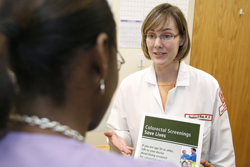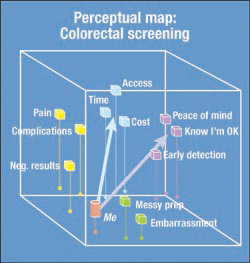Mapping misperceptions to move African Americans toward colonoscopy
|
Colonoscopies save lives, yet among African Americans, who are at greater risk of colon cancer, the screening test is significantly underutilized.
A team of Temple University researchers wants to see if certain messages, customized to address specific fears, concerns and misperceptions, will persuade more African Americans to undergo colonoscopies. The first step in their project, funded by the National Cancer Institute, was to look at the latest on African American’s perceptions about colon cancer and colonoscopy, as well as the success of different attempts to increase rates of |
 Photo by Ryan S. Brandenberg/Temple University
Dr. Stephanie Ward (right) wants to persuade more African Americans to undergo colonoscopies.
|
|
colonoscopy among African Americans. Their findings are published in the June issue of the Journal of the National Medical Association. They found that the most common barriers to colonoscopy among African Americans include lack of awareness about increased risk; fear of the results, or that the test will be painful; mistrust of the healthcare system; and poor access to healthcare. Lead author Stephanie Ward, M.D., M.P.H., explains that perception of risk is a driving force in a patient’s decision to undertake preventive health action. Dr. Ward is assistant professor of medicine and public health at Temple University and general internist at Temple University Hospital. |
|
 Map by Thomas Gordon
A hypothetical perceptual map illustrates how an individual might perceive colorectal cancer screening. Such data could someday help public health officials craft effective messages to increase rates of colonoscopy, a
live-saving cancer screening test. |
Regarding interventions, the researchers found that targeting individuals and targeting clinicians led to small increases in rates of colonoscopy. Interventions that targeted larger communities did increase knowledge about colon cancer risk and screening, but not the actual screening rates.
The researchers then held group discussions with African Americans to confirm their research findings. The information will be analyzed and used to create a perceptual map, which illustrates in 3-D the weight of each belief and the distance between the patient and the desired result — a colonoscopy. “The perceptual maps allow us to see inside the minds of patients to learn how we can communicate more effectively with them,” said study co-author Thomas Gordon, Ph.D. Based on what the perceptual maps reveal, the researchers will next create new messages and an interactive decision aid, designed to conquer the patients’ misperceptions about colon cancer and colonoscopy. |
|
Ultimately, Dr. Ward explains, the team will use all of this information to design an interactive decision aid for patients to move through online, say at a kiosk in the doctor’s office.
Other authors of “Increasing Colorectal Cancer Screening Among African Americans Linking Risk Perception to Interventions Targeting Patients, Communities and Clinicians: A Review of the Literature,” are Karen Lin, M.D., M.P.H. and Brian Meyer, M.D., M.P.H., of the Department of Medicine, Section of General Internal Medicine, Temple University School of Medicine; and Sarah B. Bass, Ph.D., M.P.H., and Lalitha Parameswaran, M.B.B.S., M.P.H., of the Department of Public Health, Temple University College of Health Professions. This study is funded by the National Cancer Institute. |
|